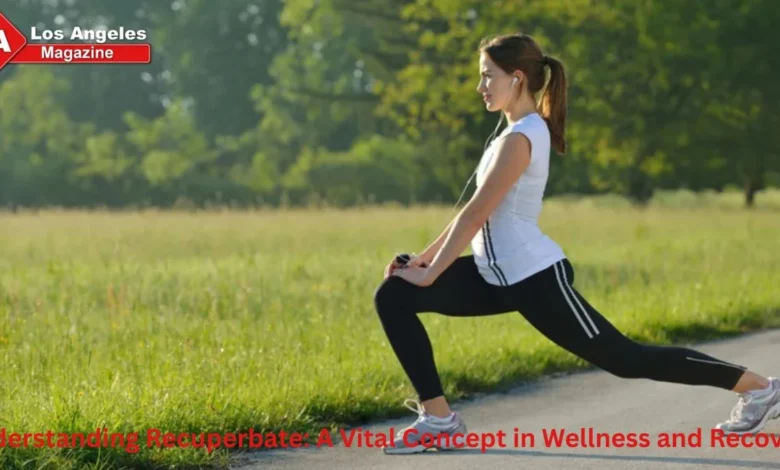Title: Mastering Recuperbate: Bouncing Back with Grace and Grit

1. What Is “Recuperbate,” Anyway?
Let’s start with the word itself: it. It’s not in your standard dictionary—yep, we’re making it up. But that’s the fun part. Imagine the word combining “recuperate” (recover, regain strength) and “celebrate.” Recuperbate is the art of recovering—physically, mentally, emotionally—and doing it with a little flair. You bounce back and you own it.
Sound fanciful? Maybe. But there’s real power in making up words that fill gaps in how we describe our feelings and resilience. Recuperbate captures that sweet moment when you’re down, you struggle, you claw your way back—and then you let yourself feel proud about it.
So, by calling it “recuperbate,” we’re naming something really universal: that triumphant, slightly cheeky moment when recovery meets style. It’s genuine, relatable—and kinda fun.
2. Why Recuperbate Is More Than Just Recovery

Now, real recovery—say, bouncing back from illness or stress—is powerful on its own. But adding a dash of celebration? That changes the game. Think about it: most of us hustle to get better, ticking off milestones quietly. But imagine pausing, acknowledging what you’ve overcome, and giving yourself a moment of joy.
That’s what makes it greater than simple recuperation. It’s not just “I’m well again.” It’s “Hey, I did that—and I’m proud!” Recovery + celebration = empowerment. It changes how you remember hardship, reframing struggle not as an indelible scar but as a stepping stone.
Also, when you make recovery an occasion, it nudges future resilience. Your brain says, “This bounce-back was meaningful, even joyful,” and next time you face a dip, your inner voice might just whisper, “You’ve done this before—and you can do it again.”
3. How to Practically Practise Recuperbate
Alright, you’re ready to recuperbate—but how, exactly? Here’s a casual expert’s roadmap:
- Acknowledge where you’ve been. Got sick, lost steam, battled burnout, or even just had a bad week? Honour that. Don’t brush it off. Saying “I struggled” out loud (to yourself or a friend) is powerful.
- Celebrate the comeback—small or big. Hit your stride again? Treat yourself. Maybe it’s a good meal, a walk in fresh air, or blasting your favourite playlist on repeat. It doesn’t need to be grand. What matters is that you feel it.
- Make a symbol. Write “recuperbate moment” in your journal, buy yourself a fresh plant, take a celebratory selfie—something tangible. Having that physical marker turns abstract recovery into a real victory that you can revisit.
When you build these steps into your life, recuperbate becomes routine. Before long, you aren’t just getting well—you’re well and thriving, with smile on your face.
4. Recuperbate in Everyday Life
Let’s talk real life. Suppose you just wrapped a rough work project. You were up late, stressing, maybe even doubting yourself. Then it wrapped, and you finally exhale—and recuperbate. Maybe that means you take a Saturday morning off binge-watching feel-good shows, or invite a friend for celebratory takeout. That’s recuperbate.
Or maybe you’ve been quieter emotionally—feeling low for days, finally get a good night’s sleep, catch sunshine outside your window, and feel…better. You spin around in that moment, acknowledging that energy. That, I argue, is recuperbate too.
It could even be communal—friends supporting each other through mental struggles, then celebrating together when the storm passes. Recuperbate becomes part of your friendship language: “I saw you, I healed, now let’s heel-a-brate!”
5. Why Experts (and You) Should Adopt “Recuperbate”
From a wellness-expert lens, naming something has power. It gives shape, legitimacy, and allows us to reference it in conversation, therapy, or personal reflection. “I need to recuperbate,” suddenly becomes shorthand for: “I’m moving out of a hard space, and I want to mark that positively.”
For coaches, therapists, or writers, it opens a new tool in the toolkit: “Recuperbate rituals” sound less clinical than “recovery rituals,” but they carry warmth, human-ness, and joy. And joy matters in healing as much as rest.
And for you? It’s fun, fresh, and affirming. A word you can whisper to yourself when you’ve made it through that wall and are standing on the other side. Elegant, quirky, perfect for a journal entry, or maybe even adding to a gratitude list: “Today, I recuperbated.”



